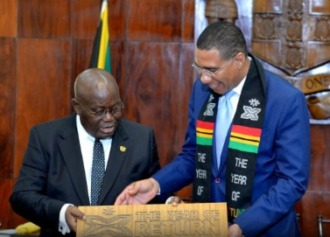There is anxiety in Jamaica as to whether the schedule of the International Monetary Fund will allow the IMF to approve a much-anticipated $750 million loan for Jamaica before the end of March.
When the IMF updated its executive board calendar last month and replaced Jamaica with the Philippines for the March 29 board meeting, it created “a matter of concern” about whether the financial body would get to Jamaica this month, former Prime Minister Bruce Golding said, according to the Jamaica Gleaner.
Golding pointed out that although March 29 is Good Friday, a day that is recognized as a public holiday in Jamaica although not in Washington,where the IMF head office is located. The last two days in the month, March 30 and 31, fall on a Saturday and Sunday, “when the existing board is highly unlikely to meet.”
Golding made his comments at a Jamaica Chamber of Commerce awards function at The Jamaica Pegasus hotel, New Kingston, on Thursday night.
But the IMF website does say the “calendar is subject to change and that the agenda for each meeting is typically finalized the day before the meeting.”
The IMF said last month that Jamaica will receive a loan for $750 million if the country can develop a significant plan for economic reforms to reduce the national debt. That plan would need to include convincing private sector lenders to agree to more lenient terms for the country’s existing debt, along with efforts from government officials to find new ways to reduce spending and adjust taxes.
Jamaica’s debt is 40 percent higher than its gross domestic product, one of the worst margins in the world. More than half of the government’s spending is used to pay down the national debt, leaving just a small percentage left for the Jamaican people after administrative costs and wages are taken out.
“Over the last three decades, the Jamaican economy has experienced very low economic growth, declining productivity, and reduced international competitiveness,” Jan Kees Martijn, the head of the IMF’s mission to Jamaica, said according to the BBC.
“An important factor behind these problems has been Jamaica’s unsustainable debt burden, which has undermined confidence and elevated risks to the economic stability.”
Jamaica’s Finance Ministry said it has submitted all necessary documentation to the IMF about its plans to reduce its debt.
But as Garnett Roper pointed out in the Gleaner, the loan will do nothing to solve Jamaica’s long-term problems.
“What this loans means is that Jamaica will be able to kick the can down the road,” he wrote. “It does not mean that, as a nation, we will fundamentally break with the cycle of poverty, low rates of economic growth, and indebtedness that has been our lot for more than three decades.”


